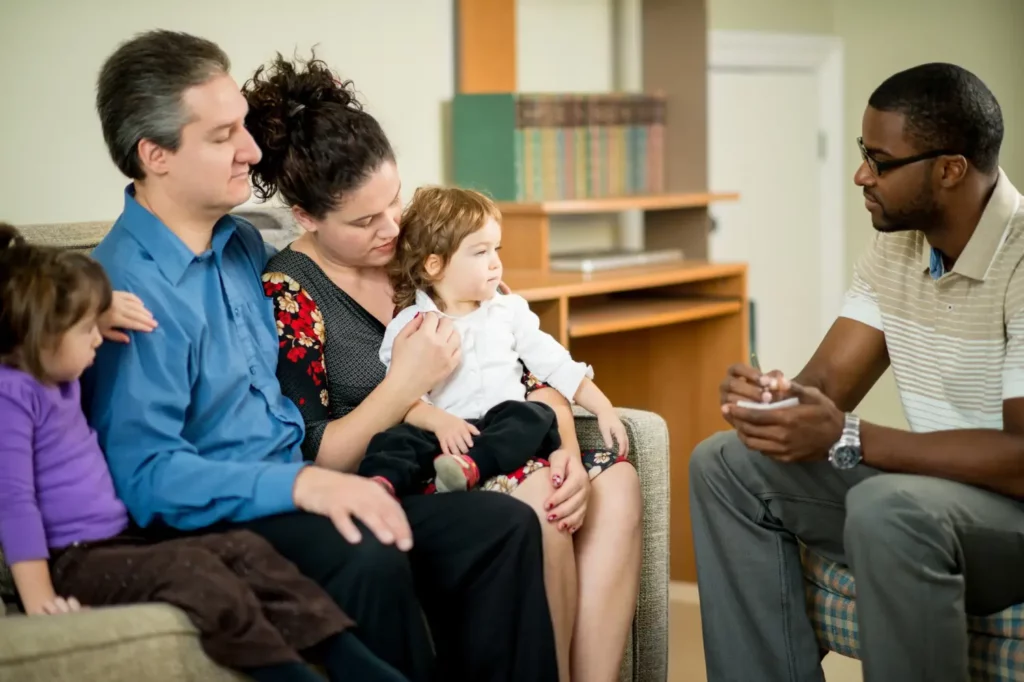Has your family been through a heart-wrenching experience that has left a significant impact on everyone involved? Are unresolved issues surfacing, creating tensions, and affecting the once-harmonious relationships? Do you often find yourself searching the phrase “family trauma therapist near me” in the hope of finding a professional to help navigate these turbulent waters?
In this blog, we aim to provide you with comprehensive guidance on how to find a specialized family trauma therapist near you. We will delve into understanding family trauma, and the role of a specialized therapist, and provide a step-by-step guide on how to find a professional who can help your family heal. So, if you are ready then let’s get started!
Contents
Why Do Families Need A Trauma-Focused Therapist?
 Family trauma can create a ripple effect, impacting not just one person but every member of the family. It’s in these scenarios that a trauma-focused therapist becomes an invaluable ally. But what specific situations prompt a family to seek therapy? Let’s explore.
Family trauma can create a ripple effect, impacting not just one person but every member of the family. It’s in these scenarios that a trauma-focused therapist becomes an invaluable ally. But what specific situations prompt a family to seek therapy? Let’s explore.
- Persistent Distress: Post-traumatic reactions and feelings can linger and resurface long after the traumatic event has passed. If these feelings are consistently causing distress or conflict within the family, it’s a signal that professional help may be required.
- Difficulty Coping: Trauma can often disrupt normal coping mechanisms. If family members are struggling to deal with daily routines, display a sudden change in behavior, or show signs of excessive anxiety or depression, it’s time to consider therapy.
- Broken Communication: Trauma can sometimes lead to a breakdown in communication within the family. Conversations may become conflict-driven, or family members may withdraw completely. A therapist can provide strategies and a safe space to rebuild these communication lines.
- Strained Relationships: If relationships between family members are suffering due to unresolved issues stemming from the traumatic event, therapy can help. A trauma-focused therapist can guide family members towards understanding and reconciling these strained bonds.
- Dysfunctional Behavior Patterns: Trauma can lead to the development of dysfunctional patterns of behavior within the family. This could include substance abuse, aggression, or other harmful behaviors. A therapist can help the family identify and address these patterns.
- Difficulty in Moving On: If the traumatic event continues to overshadow the family’s present and future, preventing them from moving forward, this is a clear sign that a therapist’s intervention is needed.
In essence, a trauma-focused therapist isn’t just for individuals who’ve experienced trauma but also for families as a unit struggling to navigate its aftermath.
How A Therapist Can Help A Family Having Trauma?

When a family experiences trauma, the aftermath can feel overwhelming, and the path toward healing may seem unclear. This is where a specialized trauma therapist steps in. Their role is multifaceted and crucial in helping families navigate their trauma. Here’s how they can help:
- Creating a Safe Space: A therapist provides a non-judgmental and confidential environment where family members can openly express their feelings, fears, and concerns related to the traumatic event.
- Understanding the Trauma: Therapists help families understand the nature of their trauma and its impact on their dynamics. They shed light on how trauma can affect individual family members and the family as a whole.
- Processing Emotions: Trauma often leads to a complex mix of emotions that can be hard to process. Therapists guide family members through their emotional journey, helping them acknowledge and validate their feelings.
- Improving Communication: Therapists can aid in restoring broken lines of communication within the family. They introduce effective communication strategies, fostering understanding, and empathy among family members.
- Teaching Coping Strategies: Therapists equip families with tools and strategies to cope with the distressing feelings and triggers related to the trauma. These could include relaxation techniques, grounding exercises, and cognitive reframing methods.
- Rebuilding Relationships: Through various therapeutic interventions, therapists help rebuild strained relationships within the family, promoting forgiveness, understanding, and reconciliation.
- Fostering Resilience: By helping families face and overcome their trauma, therapists foster resilience. They instill a sense of hope and strength, encouraging families to believe in their ability to heal and grow beyond the trauma.
Remember, therapists are not there to ‘fix’ the problems but rather to guide, support, and empower families through their healing journey. Their objective is to facilitate a space where families can heal, grow, and eventually thrive despite their traumatic past.
Techniques Used
 Therapists specializing in family trauma employ a variety of techniques tailored to the family’s unique needs. So, let’s look at some common techniques used:
Therapists specializing in family trauma employ a variety of techniques tailored to the family’s unique needs. So, let’s look at some common techniques used:
- Cognitive Behavioral Therapy (CBT): CBT helps individuals understand how their thoughts and feelings influence their behaviors. Therapists guide family members to identify and challenge harmful thought patterns that might have resulted from the trauma, fostering healthier behaviors and responses.
- Trauma-Focused Cognitive Behavioral Therapy (TF-CBT): TF-CBT is an adaptation of CBT that specifically targets families dealing with trauma. It includes techniques like psychoeducation, relaxation, affective regulation, cognitive processing, trauma narration, and more.
- Eye Movement Desensitization and Reprocessing (EMDR): EMDR involves helping individuals process traumatic memories and reduce their long-lasting effects. This approach can provide assistance to family members who find themselves trapped in their trauma.
- Family Systems Therapy: This form of therapy views the family as an interconnected system and emphasizes understanding the communication patterns and dynamics within this system. It helps families recognize and alter negative family patterns stemming from the trauma.
- Narrative Therapy: This approach helps individuals narrate their traumatic experiences in a safe environment, helping them separate their identities from the traumatic event and enabling them to rewrite their stories in a more empowering light.
- Play Therapy: For families with young children, play therapy can be a useful technique. It provides a non-threatening environment for children to express their feelings and experiences related to the trauma.
Therapists often combine and tailor these techniques to the family’s unique needs, turning therapy into a personalized healing journey. Remember, it’s essential to discuss these techniques with your therapist to understand what might work best for your family.
How To Find A Trauma-Focused Family Therapist Near Me?

Finding the right trauma-focused family therapist can be a crucial step towards your family’s healing journey. Here’s a step-by-step guide to help you find a specialized therapist near you:
Step 1: Identify Your Needs
Understand the specific needs of your family. Are you dealing with a particular type of trauma? Does your family include young children or teenagers who might need age-appropriate therapy techniques? Having a clear understanding of your needs can guide your search for the right therapist.
Step 2: Conduct Online Research
Use the internet to find therapists in your locality. You can search terms like “family trauma therapist near me” or “trauma-focused family therapist in [your location]”. Make sure to check their websites to learn about their specialties, treatment approaches, and experience.
Step 3: Use Online Therapist Directories
Online directories like Psychology Today’s Therapist Directory allow you to filter therapists by specialty, location, insurance, and more. These directories can provide you with a list of potential therapists that align with your family’s needs.
Step 4: Check Credentials
Make sure to consider therapists who are licensed and possess relevant qualifications and training in trauma-focused therapy. Credentials to look out for include licenses in Clinical Psychology, Counseling, or Marriage and Family Therapy, with additional training in trauma-focused therapy.
Step 5: Consider Therapy Format
Consider if you prefer in-person therapy sessions or are open to online or teletherapy sessions. This can significantly expand your options, especially if there are limited resources in your locality.
Step 6: Schedule Initial Consultations
Most therapists offer initial consultation sessions. Use these sessions to ask about their experience in dealing with family trauma, their approach to therapy, and any other concerns you might have. This can give you a feel of whether the therapist might be a good fit for your family.
Step 7: Trust Your Gut
Lastly, trust your instincts. You want to work with a therapist that makes your family feel comfortable, heard, and understood. If something doesn’t feel right, it’s okay to continue your search until you find the right fit.
Remember, finding the right therapist may take some time and patience, but the payoff—a guiding hand to lead your family towards healing—makes it worth the effort.
Conclusion
Dealing with family trauma can be a daunting journey, filled with uncertainty and pain. However, remember that there’s a guiding light at the end of this tunnel—professional help is available in the form of specialized trauma-focused family therapists. Remember, the path towards healing isn’t always easy or straightforward, but with the right support, resilience, and hope, your family can overcome the trauma and move towards a future where peace and harmony reign.
At CoupleMantra, our experienced relationship therapists are dedicated to supporting families like yours. We provide the tools and guidance necessary for healing and growth, helping you navigate the aftermath of trauma together. Book a trial online couple counseling session with us today and take that first step towards healing, growth, and thriving as a family.


